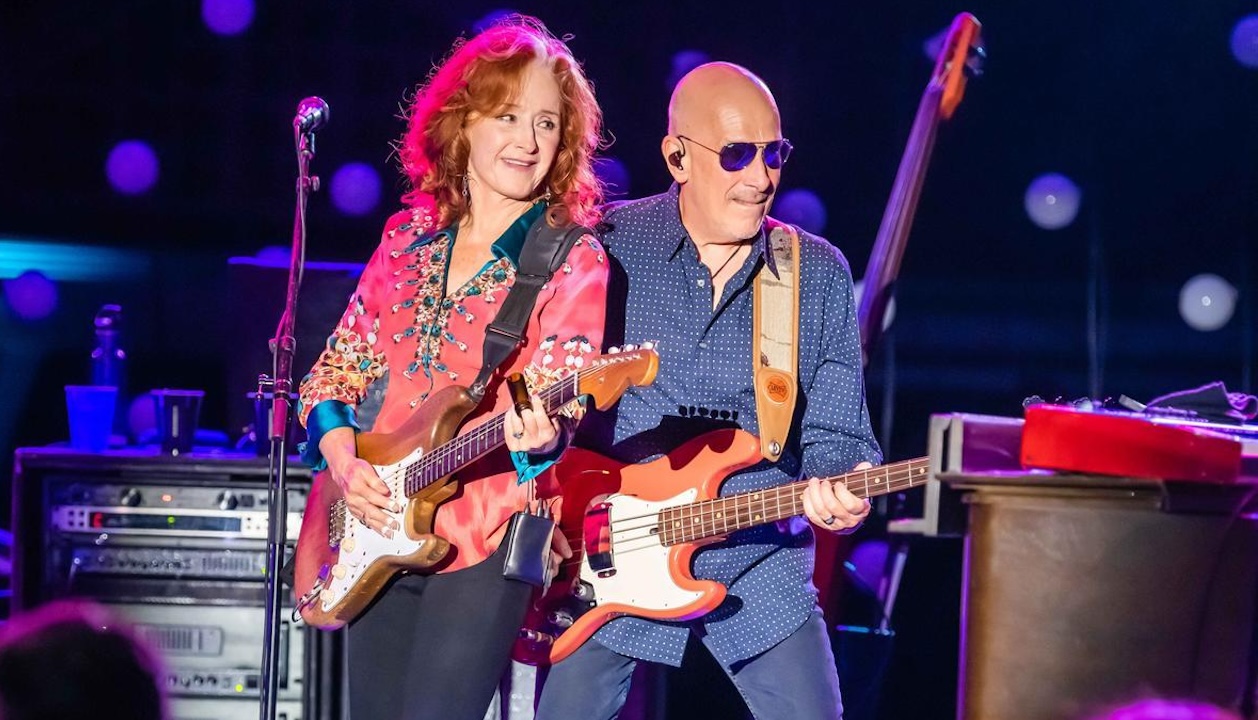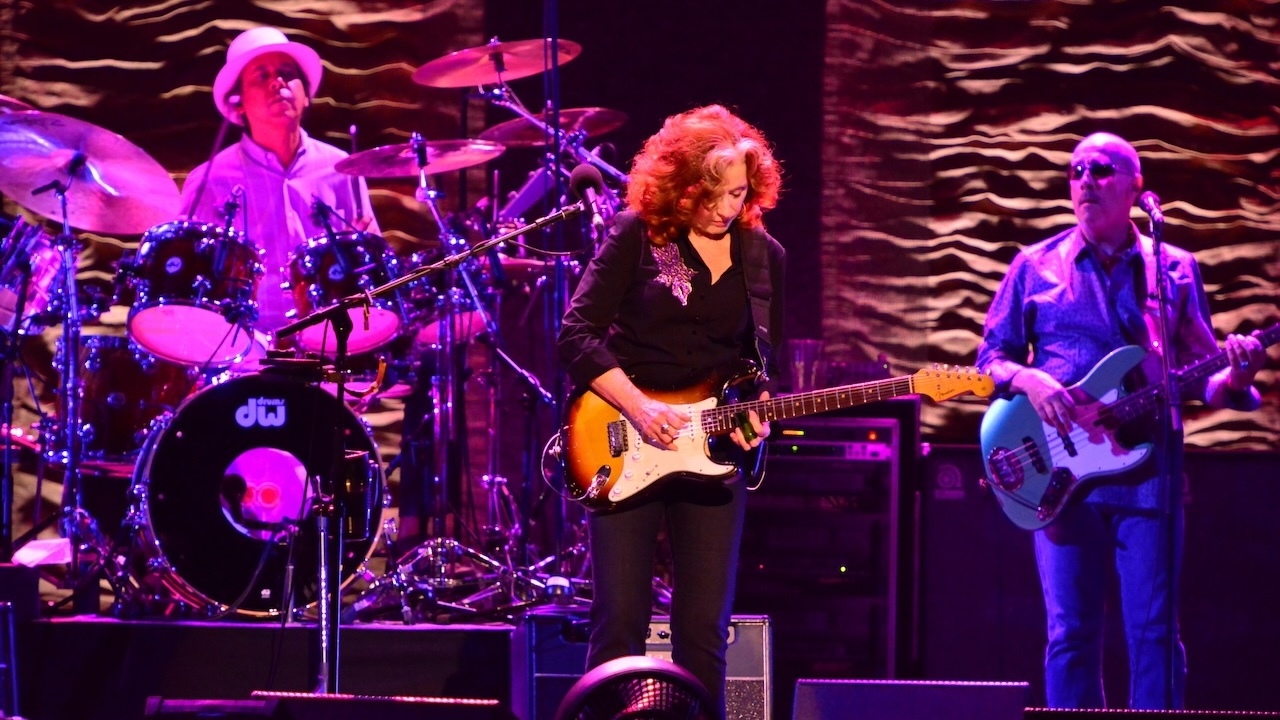
You have to stay focused as a bass player. Just ask longtime Bonnie Raitt sideman Hutch Hutchinson, whose concentration got severely tested while he was laying down tracks for Hank Williams Jr.'s Almeria Club Recordings.
The session took place in Shreveport, Louisiana, at the home of the legendary country-music radio show Louisiana Hayride. For the occasion Hutch had borrowed an upright belonging to former Hayride bassist Tillman Franks, a revered figure in Western swing and country.
“Being in that room with that bass was something else,” said Hutchinson, who cut initial tracks on bass guitar with the full band and then overdubbed the upright. “I was alone onstage doing overdubs, and by that point we had a number of Dallas Cowboy cheerleaders and Cowboy players standing around, all drinking beer with Hank.
“Meanwhile Tillman Franks, James Burton, and Hank’s manager Merle Kilgore were all watching me – it was fairly intimidating. I was hearing the track in the headphones, but they were hearing just the bass in the room. So I'm thinking, If I suck, it's really going to be evident. But everyone was dancing around and digging it, so I must have been doing something right!”
Bonnie Raitt would no doubt agree – the Grammy-winning singer/songwriter has employed Hutchinson on the road and in the studio for the past 40 years. You’ll also find his name on albums by artists such as B.B. King, Taj Mahal, Willie Nelson, Brian Wilson, Etta James, Ringo Starr, Bob Seger, and Ivan Neville.
You'll also hear him on movie soundtracks – that's Hutchinson's two-beat buoying Randy Newman's Oscar-nominated Toy Story theme, You've Got a Friend – and if you missed hearing him onscreen with Buzz Lightyear and Cowboy Woody, you might have seen him onstage with the likes of Joe Cocker, Boz Scaggs, or Crosby, Stills & Nash.
“You have to stretch your ears and listen to all types of music,” Hutchinson told Bass Player. “One reason I've been able to work with so many disparate artists – from Ziggy Marley to Hank Jr. – is because producers are aware of my tastes. It's great to hang out with rastas one weekend and rednecks the next.”
Hutch's early career took him from his Cambridge, Massachusetts, hometown to San Francisco, to various Latin American locales, to Austin, Texas, and then to New Orleans, where he worked with the Neville Brothers. In 1982 he landed in L.A., where he got a tip that bassist Ray Ohara was quitting Rait's band.
“I called up and said, ‘Hey Bonnie, I hear Ray's leaving – I can do this tour.’ And she goes, ‘Oh, really? I don't know anything about this. We have only three days of rehearsal and there are 24 songs!’ But when I got there I think I was better prepared than anybody else.”
“Hutch is always prepared, and I've never heard anybody as versatile,” Raitt told Bass Player back in '93, “Above all, he's a listener.”

The following interview took place in the June 2002 issue of Bass Player, with Hutchinson having just finished recording on Raitt's Silver Lining album.
The first track on Silver Lining, Fool's Game, is typical of a lot of your bass playing. Though the rhythm section locks into the syncopated line, you manage to build your part and do a lot of variations.
“I'm all over the place – it's pretty loose. That's a real Meters-style New Orleans funk groove, and there's so much freedom in that music. It's all about call and response. You say something, and I say something back. That's great for a bass player, because you have so much to bounce off of.”
In the course of that conversation you vary your note length a lot.
“I'm conscious of that more in some music than in others. In pop or reggae or country, note length becomes extremely important – on a country ballad, note length is about the only thing you can vary! In those situations the bass is really helping to orchestrate the song.”
Do you track along with the vocals on Raitt's sessions?
“We try to get as much as we can on the initial take. When you're tracking it's important to have the artist singing with as many of the musicians as possible. The vocals are the communicator – that's what people listen to.”
On the song Silver Lining, there's a vocal high point, and you're there with it.
“We first cut that tune as if we had worked it up in pre-production, but it didn't seem to be working. So we started dismantling it – tearing down the house and building it back up. We worked on it for most of a day, and at 10:30 or 11 we said, ‘Okay, we'll do one more and we'll come back to it tomorrow.’ I was half-asleep when I played it, and I thought, ‘Well, that's not it.’
“The next morning the producer goes, ‘We got it last night.’ I couldn't believe that was the part they liked – there's not one bass phrase played the same way twice in the entire tune. What happened was I stopped thinking about playing the song and just went with the vocal.”
Apart from total exhaustion, what do you recommend for taking a fresh approach to a track?
“That's one of the most difficult things. Working with Ivan Neville, who constantly reshuffles the way he looks at a tune, I learned not to discard ideas before you've tried them. It's really important to explore different avenues.”
People with home studios have that freedom.
“Exactly. Why not try a tune with a whole different groove? If it's a good song you should be able to adapt it to other rhythmic ideas. Take it to Jamaica. Take it to Brazil. Or come up with something of your own.”
You and Drummer Ricky Fataar cover a big stylistic range.
“At rehearsal with Bonnie, Ricky and I instigate a lot of the grooves. We'll start playing something and she'll go, ‘That's great – what's that?’ We have turned her on to a lot of world music. After playing together for so long we all have a lot of freedom. Everybody in the band is willing to just play what they feel.”
Do you miss that freedom when you do other people's sessions?
“That used to be the case. People would call me because I was just ‘one of the guys,’ but now they call me because they want what I do. I also work a lot with Jim Keltner, who is renowned for his creativity, so when we play together I get a lot of freedom, too. People want us to do our thing; they could call somebody like Neil Stubenhaus if they wanted someone just to read the charts.”
After playing with the same artist for so long, how do you keep things fresh?
“While I'm working with Bonnie I still have a separate career as a studio musician, and I go on the road with other people. So those things keep me fresh. But it's not like working with Bonnie is like working in a bank or something. How many people get to play with musicians who understand each other's personal and musical lives the way we do? That's really special.”
Does your big bass collection relate to your diverse musical tastes?
“It plays into it. You hear a certain sound on a certain record, and you want to achieve it. And if you're doing a record with Ringo you want a Beatle bass. But I've bought a lot of basses just because they piqued my interest.”
What would you tell someone who makes a living playing night after night with the same group, but it's not at quite the same level as Raitt's band?
“As long as you can make a career out of playing music, you're in pretty good shape. If you're working five nights in a club – well, that's better than working five nights in a gas station! I still have that attitude.
“What better way can you make a living than by making people happy, unless you're a fireman or a doctor or someone like that? But as a musician you're helping heal people, too – hopefully they feel better when they hear you play.”







